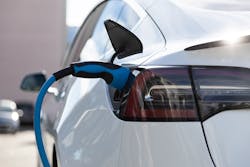White House: Federal EV Charging Station Standards Move America Toward Coast-to-Coast Network
Federal agencies have agreed to standards for government-funded electric vehicle (EV) charging stations, a development that should make it easier for manufacturers to develop and deploy systems to take advantage of nearly $5 billion in public funds.
Biden-Harris administration officials say this groundwork could lead to a made-in-America charging network that's reliable and convenient.
With the Department of Transportation and the Department of Energy partnership, the finalized standards support EV charging regardless of the type of car or state.
To qualify for public funds, chargers must be made domestically.
“The plan requires that, effective immediately, final assembly and all manufacturing processes for any iron or steel charger enclosures or housing occur in the United States. By July 2024, at least 55% of the cost of all components will need to be manufactured domestically as well,” White House officials said.
Many companies have announced their intent to contribute to the domestic EV charging infrastructure, including Tesla, which will open some of its U.S. Supercharger and Destination Charger network to other EVs, according to the release.
Other announcements include:
- The DOE announced $7.4 million in funding for multiple projects to “develop innovative medium-and heavy-duty EV charging and hydrogen corridor infrastructure plans serving millions of Americans across 23 states.”
- More details of the FHWA Charging and Fueling Infrastructure discretionary grant program. To roll out alternative fueling infrastructure, $700 million will be available through the first round of funding out of a planned $2.5 billion over five years.
While over $100 billion has been invested in domestic electric vehicle, battery and EV charging manufacturing from the private sector, Biden's office says these steps could fill gaps in rural and hard to reach locations.
U.S. manufacturing is poised to benefit from EV chargers purchased through the National Electric Vehicle Infrastructure program (NEVI), creating jobs and incentivizing companies to invest in U.S. production. “Three years ago, there was little American footprint in the advanced EV charging industry. Now, producers are making investments to establish new headquarters, facilities, or production lines to build the next generation of EV chargers in the United States.”
These actions build on the previous commitment by Biden to build a network of 500,000 EV chargers by 2030.
About the Author
IW Staff
Find contact information for the IndustryWeek staff: Contact IndustryWeek
